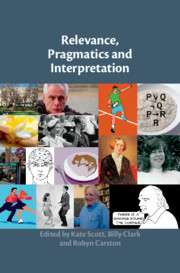Book contents
- Relevance, Pragmatics and Interpretation
- Relevance, Pragmatics and InterpretationEssays in Honour of Deirdre Wilson
- Copyright page
- Contents
- Contributors
- Cover Acknowledgements
- Introduction
- Reflections on the Development of Relevance Theory
- Part I Relevance Theory and Cognitive Communicative Issues
- Part II Pragmatics and Linguistic Issues
- Part III Figurative Language and Layered Interpretations
- 15 Metaphor and Metonymy in Acquisition
- 16 Relevance and Metaphor Understanding in a Second Language
- 17 Component Processes of Irony Comprehension in Children
- 18 Allegory in Relation to Metaphor and Irony
- 19 Slave of the Passions
- 20 Adaptations as Communicative Acts
- References
- Author Index
- Subject Index
17 - Component Processes of Irony Comprehension in Children
Epistemic Vigilance, Mind-Reading and the Search for Relevance
from Part III - Figurative Language and Layered Interpretations
Published online by Cambridge University Press: 08 July 2019
- Relevance, Pragmatics and Interpretation
- Relevance, Pragmatics and InterpretationEssays in Honour of Deirdre Wilson
- Copyright page
- Contents
- Contributors
- Cover Acknowledgements
- Introduction
- Reflections on the Development of Relevance Theory
- Part I Relevance Theory and Cognitive Communicative Issues
- Part II Pragmatics and Linguistic Issues
- Part III Figurative Language and Layered Interpretations
- 15 Metaphor and Metonymy in Acquisition
- 16 Relevance and Metaphor Understanding in a Second Language
- 17 Component Processes of Irony Comprehension in Children
- 18 Allegory in Relation to Metaphor and Irony
- 19 Slave of the Passions
- 20 Adaptations as Communicative Acts
- References
- Author Index
- Subject Index
Summary
Tomoko Matsui takes a developmental perspective on ironical language use and considers the role of epistemic vigilance and mind-reading mechanisms in children’s understanding of irony. She discusses evidence that indicates that children as old as 9 years may misinterpret instances of irony as deliberate lies and suggests that this is a result of their developing epistemic vigilance mechanisms (specifically, a sensitivity to the truth or falsity of information) together with a not yet fully mature appreciation of how information can achieve relevance.
- Type
- Chapter
- Information
- Relevance, Pragmatics and Interpretation , pp. 231 - 239Publisher: Cambridge University PressPrint publication year: 2019
- 1
- Cited by

